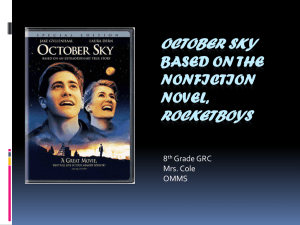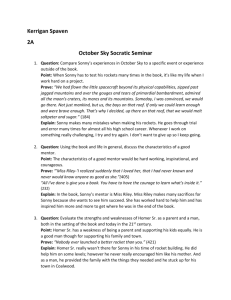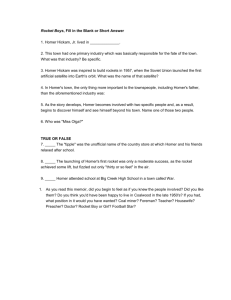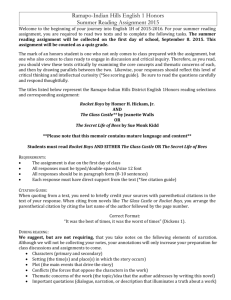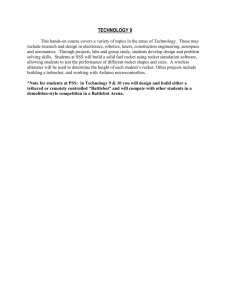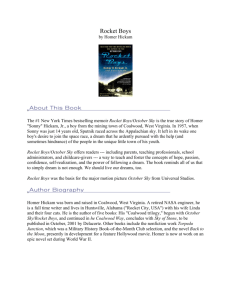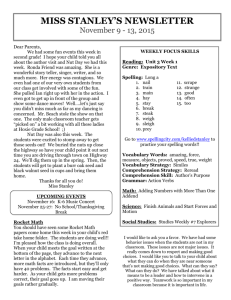Discussion Questions for Rocket Boys - Tosa`s All
advertisement
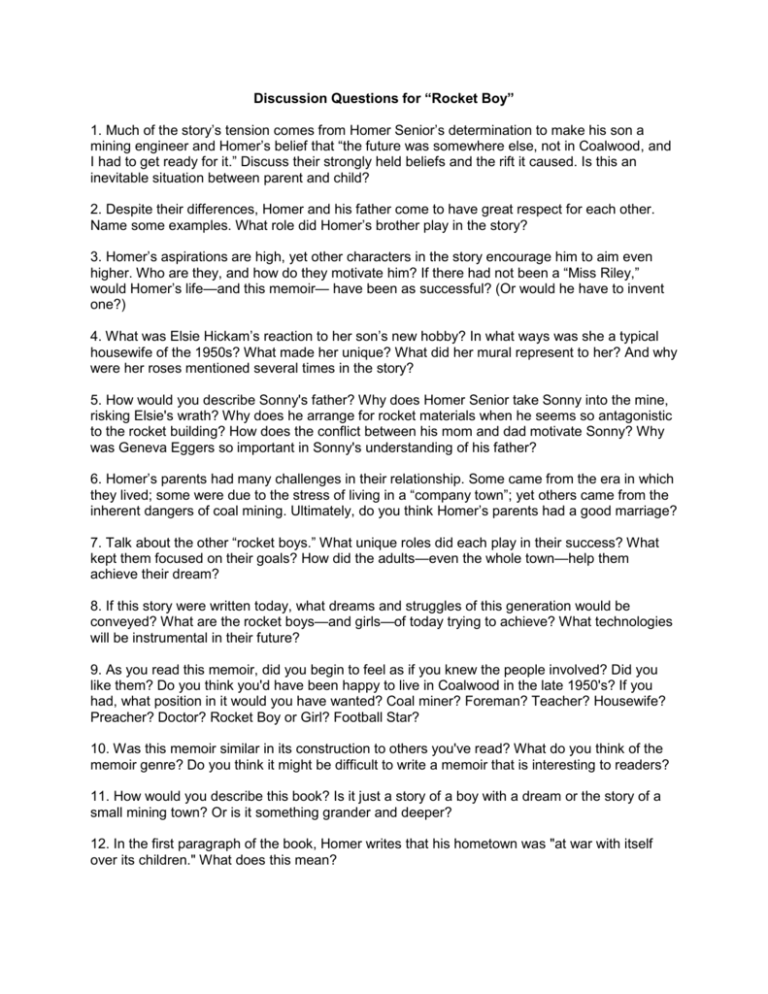
Discussion Questions for “Rocket Boy” 1. Much of the story’s tension comes from Homer Senior’s determination to make his son a mining engineer and Homer’s belief that “the future was somewhere else, not in Coalwood, and I had to get ready for it.” Discuss their strongly held beliefs and the rift it caused. Is this an inevitable situation between parent and child? 2. Despite their differences, Homer and his father come to have great respect for each other. Name some examples. What role did Homer’s brother play in the story? 3. Homer’s aspirations are high, yet other characters in the story encourage him to aim even higher. Who are they, and how do they motivate him? If there had not been a “Miss Riley,” would Homer’s life—and this memoir— have been as successful? (Or would he have to invent one?) 4. What was Elsie Hickam’s reaction to her son’s new hobby? In what ways was she a typical housewife of the 1950s? What made her unique? What did her mural represent to her? And why were her roses mentioned several times in the story? 5. How would you describe Sonny's father? Why does Homer Senior take Sonny into the mine, risking Elsie's wrath? Why does he arrange for rocket materials when he seems so antagonistic to the rocket building? How does the conflict between his mom and dad motivate Sonny? Why was Geneva Eggers so important in Sonny's understanding of his father? 6. Homer’s parents had many challenges in their relationship. Some came from the era in which they lived; some were due to the stress of living in a “company town”; yet others came from the inherent dangers of coal mining. Ultimately, do you think Homer’s parents had a good marriage? 7. Talk about the other “rocket boys.” What unique roles did each play in their success? What kept them focused on their goals? How did the adults—even the whole town—help them achieve their dream? 8. If this story were written today, what dreams and struggles of this generation would be conveyed? What are the rocket boys—and girls—of today trying to achieve? What technologies will be instrumental in their future? 9. As you read this memoir, did you begin to feel as if you knew the people involved? Did you like them? Do you think you'd have been happy to live in Coalwood in the late 1950's? If you had, what position in it would you have wanted? Coal miner? Foreman? Teacher? Housewife? Preacher? Doctor? Rocket Boy or Girl? Football Star? 10. Was this memoir similar in its construction to others you've read? What do you think of the memoir genre? Do you think it might be difficult to write a memoir that is interesting to readers? 11. How would you describe this book? Is it just a story of a boy with a dream or the story of a small mining town? Or is it something grander and deeper? 12. In the first paragraph of the book, Homer writes that his hometown was "at war with itself over its children." What does this mean? 13. The women of Coalwood are strong women who make the best of their lot, but they want a better life for their children. How can they help this to happen? How about the teachers called "The Great Six?" What is your opinion of Elsie, Sonny's mother? And Miss Riley? 14. Is this a universal story? Could it be set in other times or is it specific to Coalwood and West Virginia in the late ’50s? 15. This story is also about the rewards and costs of nonconformity. Who conforms, who doesn't, and what are the consequences of their actions? Is that a problem today? How was Quentin a nonconformist? How about the other boys? 16. In Chapter 22, Mr. Turner, the Big Creek High School principal, tells Sonny, "In the queer mass of human destiny, the determining factor has always been luck." But in Chapter 26, Homer writes, "There's a plan. If you are willing to fight hard enough, you can make it detour for a while, but you're still going to end up where God wants you to be." Are these quotations about human fate really in conflict with each other? How do they apply to the story? 17. Rocket Boys is an excellent way to think about and discuss the many steps it takes to achieve a goal. Sonny's idea of building rockets starts as simply a dream, but then he takes the necessary steps to make it come true. Discuss the importance of incremental steps in your life. Why does Quentin believe in the necessity of obtaining what he calls a "body of knowledge?" 18. Miss Riley, the physics teacher, seems to regard education as a challenge and adventure. Sonny rises to meet the formidable task she sets before him. That challenge is taken to the next level by Miss Riley when she gives him the book Principles of Guided Missile Design, saying, “All I've done is give you a book. You have to have the courage to learn what's inside it.” Discuss Miss Riley's motivational techniques. 19. When Sonny thinks of giving up rocketry altogether, Miss Riley tells him: "You've got to put all your hurt and anger aside so that you can do your job… Your job, Sonny, is to build your rockets… If for no other reason, because it honors you and this school." It's clear that she means it also honors Coalwood. Discuss the concept of civic pride. How do the Rocket Boys help the town? 20. Discuss the motivational aspects contained within this story. How did Sputnik motivate Sonny? How does his mother motivate him after he blows up her rose garden fence with his first rocket ("I believe you can build a rocket. [Your father] doesn't. I want you to show him I'm right.") How important is motivation in all our endeavors? 21. The final chapter in the book finishes with the launch of the last rocket of the Big Creek Missile Agency. Homer Senior is invited to launch this rocket. Why do you think this invitation was made? Why do you think he accepted?


